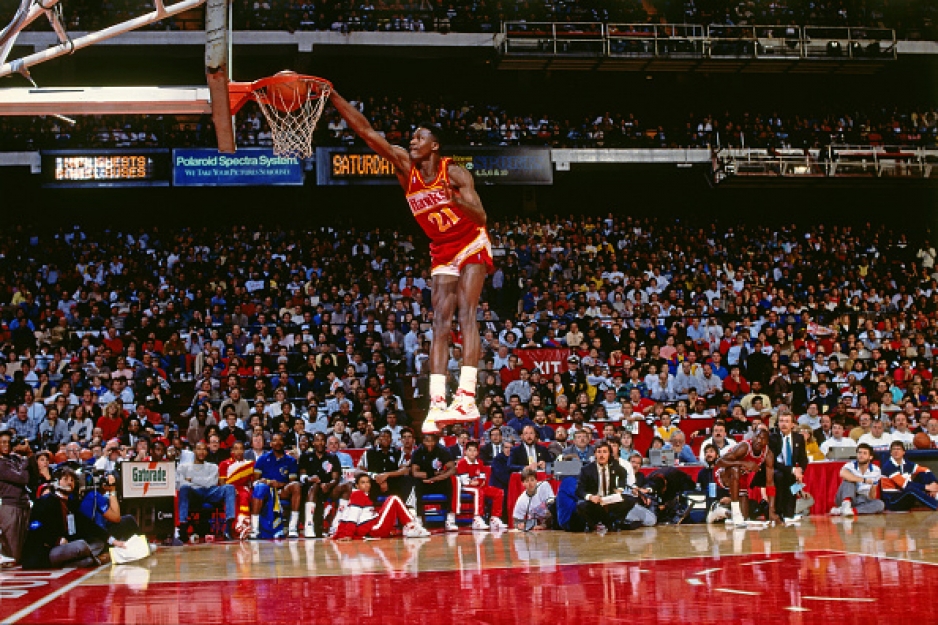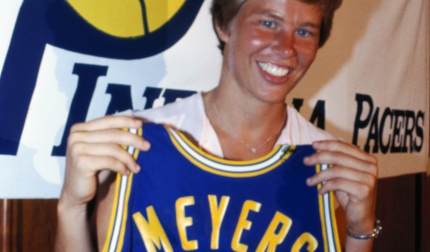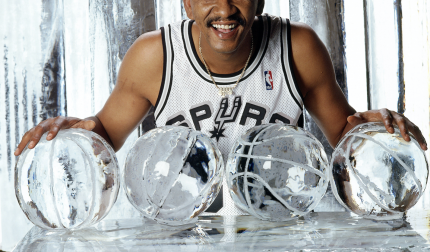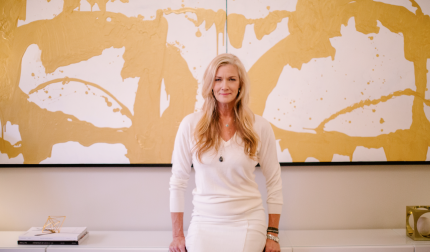Of all the greats to play pro basketball, perhaps no player elevated their game above the rim more than Dominique Wilkins. But the nine-time NBA All-Star was much more than just a dunker.
Where did you grow up?
I was born in Paris. My dad was in the military, and he was stationed there. I was five years old when I came to the United States, and we relocated to Baltimore, Maryland.
What was that like?
It was rough! At that time, Baltimore had the highest crime rate in America. It was a very difficult place to grow up, but that’s where I learned how to play the game—on the streets of Baltimore.
Did you know early on that you wanted to play professional basketball?
Believe it or not, I knew in junior high that I was going to be a pro. I worked every day from sunrise to sundown, just playing the game. By the time I got to high school, I knew that I had something special. I went to play high school ball in North Carolina. We went 76-1 in the three years that I was there, and we won back-to-back state titles.
How did you decide to go to the University of Georgia?
I had signed a letter of intent to go to North Carolina State. At the last minute, I decided to go to the University of Georgia. North Carolina State was telling me that I was going to be the next David Thompson. It would have been a great freshman class. That class ended up winning the national championship with Dereck Whittenburg, Sidney Lowe and Thurl Bailey. But I wanted to build my own name.
In 1982, you were being considered as the first overall pick in the draft.
I was supposed to be the first overall pick in the draft, but Mitch Kupchak got hurt for the Los Angeles Lakers, so they had to take a bigger forward. That’s when they decided to take James Worthy. I got drafted by the Utah Jazz, but I never went there (laughs).
What happened?
When Utah drafted me, they said that I would play power forward and that Adrian Dantley was going to play small forward. I said, “You might as well trade me today, because I’m not going to play power forward.” In those days, power forwards were rugged! They were 6-foot-10 guys that would bang you around the court. I’m 6-foot-8; that’s not going to work (laughs). These were big physical skilled guys that were just brutes! I remember one time, I switched over to guard Sam Perkins, who was a legit 6-foot-11, all legs. I remember my eyes were at his waist when I was holding him off the post. I said, “No thanks! I’m good at small forward.”
Small forward wasn’t exactly a vacation.
My first few games in the league, I was matched up against Julius Erving, Larry Bird, Alex English, Adrian Dantley, Marques Johnson, James Worthy, Larry Nance, Bernard King. This was just the first few weeks in the league! I haven’t even talked about guys like Terry Cummings and Tom Chambers. Every game was physical. I was like, “Wow! If the league is like this, it’s going to be tough (laughs)!” Once I got over the aura of it, I got into a routine and it was fine, but you had to come to fight every night.
Given your high-flying style of play, it must have been even more physical. I can’t imagine guys enjoyed getting dunked on.
They didn’t let you walk down the lane. All that banging on the chest? The flipping powder in the air? No, no, no, no, no! You weren’t going to do that. Guys would lay the wood on you, if they felt you were trying to embarrass them! They’d hit you with an elbow right in the chest. If you won the game, fine, but you weren’t going to disrespect anybody. We did that once against the Philadelphia 76ers. I remember it like it was yesterday. We beat Philadelphia by 20 at home. We were celebrating, high fiving and talking trash. The older Philly team was just sitting on the bench, watching us. We went back to Philly a week later, and we were down 30 in the first half. Moses Malone came over and said, “High five now, m-f’ers! (laughs)” That was the last time we did that.
Were you a trash talker?
No. If I didn’t like somebody, I would go at them, but I wasn’t a trash talker. My brother, Gerald, on the other hand, he was a big trash talker. Gerald was a part of the all-trash talker team—him, Chuck Person, Johnny Newman. One night, I’ve got 47 points and Johnny Newman goes, “You’re not scoring any more tonight.” I’m like, “Johnny, I’ve got 47, I don’t want to score any more tonight! Are you kidding me?”
You were always good, but when did you feel you arrived in the NBA legend stratosphere?
The first year I made the All-Star team in 1986, it was a whole new level. There was one year that I averaged 27 points a game and I didn’t even make the All-Star team! Look at the guys that I had to beat out! Doctor J? Not beating him out. Larry Bird? Not beating him out. Bernard King? Marques Johnson? Those were just the guys in the East. They were already established. They had proven themselves. They were going to get picked. They didn’t give you anything. You had to earn it.
The Slam Dunk Contest also elevated you to an entirely new status in basketball.
I did the dunk contest five times. We did it for the fans—me, Jordan, Doc, Drexler, we didn’t do it for ourselves. That was the signature event for All-Star Weekend. Now, you can’t even get guys to do it. The top players won’t get in it, so it’s boring for me. It’s not the same.
In 1988, you went against Michael Jordan in Chicago in the Slam Dunk Contest. I can’t imagine another player taking on that challenge.
That’s why they call it competing! We competed hard in everything that we did. It was more about the fans. Of course we wanted to win, but we wanted to entertain people. We’re entertainers.
If your series between the Hawks and the Boston Celtics in 1988 was the NBA Finals, people would probably still consider it the greatest playoff series of all time.
It was unbelievable. When we lost Game Six, Larry Bird said that we blew our opportunity, and he guaranteed a win. I said, “To hell with that! We’re coming to win. We ain’t coming here to lose.” But he was telling his team the same thing in the other locker room (laughs). It was one of the greatest shootouts in NBA history.
You scored 47 points in Game Seven at the Boston Garden, but the Celtics won 118-116.
The amazing thing about that game? Kevin McHale had 33 points that game and people don’t even talk about that. That shows you the type of firepower they had. Bird had 34 points. Robert Parish played great. Dennis Johnson played great. That’s four Hall of Famers, plus Danny Ainge had a great game.
After that, you were really the first player to tear his Achilles tendon and come back to play at the same skill level. It had never been done before.
Everyone said my career was over, and that if I came back I would never be the same. I vowed that not only am I going to come back, I’m going to be better than ever. They gave me that sarcastic pat on the back, you know? Like, “Sure you will!” I worked twice a day, every day, for nine months. Every single day. When I came back, I had one of my best all- around seasons. I averaged close to 30 points a game.
Did people just think you wouldn’t be a high flyer any more?
I didn’t score over 26,000 in the NBA on dunks. I got them in every way—mid-range shots, on the post, getting to the line 10 times a game. I had it all offensively. But when you’re a high flyer, that’s what people remember. It overshadows everything else that you’ve done. I could make three-pointers when I need to, but I was more concerned about getting to the free throw line. And I saw double coverage every night. The great players in that era never played against single coverage.
You were such a central part of Atlanta. You even had a club there, didn’t you?
That was a looooong time ago (laughs). It was called Dominique’s Downtown, and we used to have live entertainment there. We had all kinds of acts perform there. Prince played there! New Edition, Keith Washington, so many people came through there. It was fun in those days. And I don’t ever remember having an incident or a fight in there. It was a class joint. First of all, you had to have a suit to get in. We made no exceptions.
So you had a dress code before the NBA did?
Oh yeah! Back then, as players we all wore suit and ties. You didn’t even think about it. We wanted to project a certain image. If you didn’t abide by our rules, you didn’t get in.
How did you feel when Atlanta traded you to the LA Clippers?
I was disappointed. I wanted to retire as an Atlanta Hawk. When I got traded, I was devastated. It was the dumbest trade in the history of basketball. The night before, our coach Lenny Wilkens said, “We’ve got to get this young team ready to go into the playoffs. You’re the franchise player.” And the next day, they traded me, I was going to be a free agent, and they weren’t going to pay me. They figured they could get a younger player to do what I did and pay them less, and it never happened. Stan Kasten, the general manager, always said that a player would never retire on him. And that was true for a long time.
What was playing for the Clippers like?
In one word—terrible! It was like Disney World. I remember before one game, I’m in the locker room, and I go to use the restroom. When I walk in, there’s a ping-pong table in the shower. I go to Mark Jackson, and I say, “Are you serious? There’s a ping-pong table in the shower?” And Mark said, “Welcome to LA!”
Not exactly the winning environment you were accustomed to?
It was ridiculous. I’m upset. I just got traded. I sit down, and I’m mad. I see this kid wearing shorts down below his knees and a T-shirt that is way too big for him. So I’m like, “Ball boy! Go get me some socks!” And he’s like, “I’m not a ball boy! I play on this team (laughs)!” The kid’s name was Randy Woods. He didn’t talk to me for three weeks after that. I didn’t care. I was miserable.
Things got better when you went to Boston.
I went because of Red Auerbach. I was always very well received there. But it was always weird. We hated them! I still always thought of myself as a Hawk.
When did you decide to retire?
You try to tell yourself you’re ready to retire, but you’re not. That’s why Jordan kept coming back. He still felt like he had a few years left. That’s how I felt. That’s why Karl Malone went to play in LA. You’re never ready to leave. In Orlando, Doc Rivers was coaching the team. They were trying to go with their younger guys. I said, “You know what? I’ve got an offer to work in the front office in Atlanta. I’m going to retire and go there.” I wasn’t ready to leave, but I went, and I’ve been there ever since. It’s been 16 years now. It’s a franchise and a city that I love.
And now there is a beautiful statue of you outside the Philips Arena in Atlanta?
The organization did a great job putting that together. The team ownership, the parks and recreation department, the Fulton County Commission—everyone played a part to make it happen. I’m truly grateful for how well it all came together. I love Atlanta. The people have been amazing. I’m now the Senior Advisor to the CEO and Vice President of the team. I’m also an analyst for the games on Fox. I still wear a lot of different hats.
What would you like to be remembered for the most?
These days, I put a lot of work into philanthropy. I do a lot of work on Capitol Hill for diabetes awareness. My grandfather died from diabetes. My father died from it, and I have it. We live with it every day, and I want to help find a solution for it. My youngest daughter has spinal bifida, and I’m actively involved in that cause as well. I also want to be remembered for how hard I worked and how much I gave. I didn’t want to disappoint anyone. I never took a day off. I played hurt, played sick. I needed to give the fans what they paid to see.





